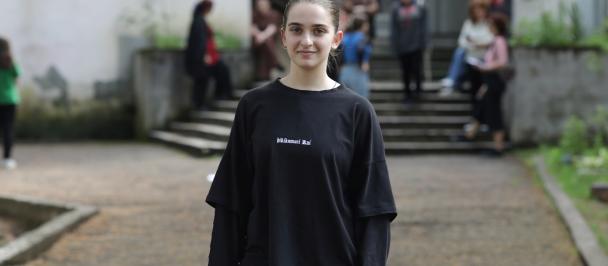Women Winemakers Crush Outdated Stereotypes, Bottle Success
Women’s Turn!
June 16, 2023

Baia and Gvantsa Abuladze at their vineyard
A women-led winery in Western Georgia, run by two extraordinary sisters, Baia and Gvantsa Abuladze, makes a bold statement in Georgian and European markets.
Breaking Barriers
Baia Abuladze, a young visionary, shattered the glass ceiling of Georgia’s male-dominated wine industry in 2015. Armed with passion and determination, she ventured into the family vineyard in the village of Obcha, ready to embrace her true calling. Her dream was to rediscover the long-forgotten wine grape varieties of Western Georgia and champion the art of bio-winemaking.
"With every bottle, I strive to showcase the unparalleled quality of our hand-selected grape wines,” Baia says.

Gvantsa Abuladze
A Journey of Rediscovery
As the years passed, Baia's wines gained increasing recognition for their exceptional taste and outstanding quality. In 2016, she was joined by her younger sister, Gvantsa Abuladze, who shared her vision and determination. In addition to producing more conventional wine varieties, Gvantsa introduced a collection of Pét-Nats, or naturally sparkling wines, that have gained popularity in Georgia over the past few years.
“Our wines honour Georgia's rich winemaking legacy while embracing the limitless possibilities of innovation,” Gvantsa says.
Together, the Abuladze sisters became a symbol of entrepreneurial triumph. They successfully export their wines to over 15 countries worldwide showcasing the untapped potential of Georgian vine varieties with their natural sparkle and enchanting fruity flavours.

The labeling device
The Power of Collaboration
Recognizing the Abuladze sisters' boldness and entrepreneurial spirit, the United Nations Development Programme (UNDP) stepped in to offer their support. In 2017, Baia was invited to take part in a professional business training programme, providing her with the necessary skills to navigate the competitive landscape.
In 2022, the European Union (EU) and UNDP joined forces to provide grant support to "Baia's Wine" and “Gvantsa’s Wine” brands. This financial boost allowed the sisters to purchase cutting-edge packaging and labelling equipment, enabling them to meet the rigorous standards required for the European market.
In addition to the grant, both brands became a part of Georgia's Packaging Cluster (PMAG), a network supported by the EU and UNDP. The cluster aims to provide technical and consultative assistance to Georgian enterprises, fostering innovation, enhancing competitiveness, and supporting smart and green businesses.
"Baia and Gvantsa Abuladze exemplify the resilience and potential of Georgian entrepreneurs. By nurturing their talent and supporting their growth, we are investing in the future of Georgian winemaking,” says H.E. Pawel Herczynski, Ambassador of the European Union to Georgia.
Nick Beresford, UNDP Resident Representative in Georgia, notes that the immense potential of women entrepreneurs has been overlooked for far too long. "By investing in and supporting women like Baia and Gvantsa, we help drive innovation, create jobs, strengthen communities, and build an equal and inclusive future for all. Our goal is to ensure that women entrepreneurs in Georgia have the necessary resources, mentorship, and enabling environment to thrive."
And so, Baia and Gvantsa Abuladze continue to flourish, their winery serving as an inspiration for a new generation of women winemakers. With every bottle of wine they produce, they honour their heritage, challenge stereotypes, and illuminate the path towards a future where women's voices and talents are celebrated in every sphere.
Background Information:
The “EU Innovative Action for Private Sector Competitiveness in Georgia” is the EU-funded EUR5.7 million initiative implemented by UNDP, the Food and Agriculture Organization, the United Nations Industrial Development Organisation and the International Organization for Migration in cooperation with Georgia’s public and private sectors. It aims to promote entrepreneurship, improve legislative frameworks, increase access to finance and strengthen cooperation with the EU Member States.
Disclaimer:
This story has been produced with the assistance of the European Union (EU) and UNDP. Its contents do not necessarily reflect the views of the EU and UNDP.

 Locations
Locations




